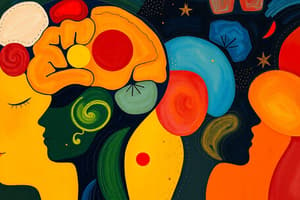Podcast
Questions and Answers
Which area of psychology focuses on mental processes like perception, learning, and reasoning?
Which area of psychology focuses on mental processes like perception, learning, and reasoning?
- Social Psychology
- Cognitive Psychology (correct)
- Biopsychology
- Developmental Psychology
In which branch of psychology do professionals work with individuals diagnosed with various psychological disorders?
In which branch of psychology do professionals work with individuals diagnosed with various psychological disorders?
- Biopsychology
- Clinical Psychology (correct)
- Developmental Psychology
- Social Psychology
Which area of psychology explores how individuals change over time through different life stages?
Which area of psychology explores how individuals change over time through different life stages?
- Biopsychology
- Social Psychology
- Cognitive Psychology
- Developmental Psychology (correct)
What does biopsychology primarily focus on?
What does biopsychology primarily focus on?
Which branch of psychology investigates how individuals interact with one another and adapt to their environment?
Which branch of psychology investigates how individuals interact with one another and adapt to their environment?
What does cognitive psychology seek to understand about humans?
What does cognitive psychology seek to understand about humans?
What type of psychology investigates how individuals influence each other and how social interactions affect us emotionally, cognitively, and behaviorally?
What type of psychology investigates how individuals influence each other and how social interactions affect us emotionally, cognitively, and behaviorally?
Which psychological disorder is characterized by persistent feelings of sadness, hopelessness, and a lack of interest in activities?
Which psychological disorder is characterized by persistent feelings of sadness, hopelessness, and a lack of interest in activities?
Which psychology branch merges biological science with psychology to explore the interconnection of physiological, genetic, neuropsychological, and behavioral factors?
Which psychology branch merges biological science with psychology to explore the interconnection of physiological, genetic, neuropsychological, and behavioral factors?
What aspect of psychology examines how individuals develop over their lifespan, including growth, maturation, and aging?
What aspect of psychology examines how individuals develop over their lifespan, including growth, maturation, and aging?
Which psychological topic might encompass studies on conformity, persuasion, prejudice, and group dynamics?
Which psychological topic might encompass studies on conformity, persuasion, prejudice, and group dynamics?
What type of treatments may be recommended for psychological disorders based on the text?
What type of treatments may be recommended for psychological disorders based on the text?
Flashcards are hidden until you start studying
Study Notes
Psychology Overview
Psychology is a diverse field of study that encompasses many different areas within human behavior, thoughts, and emotions. It explores the ways people think, feel, behave, interact with one another, and how they adapt to their environment. Here, we'll take a look at some key aspects of this multifaceted discipline, including cognitive psychology, developmental psychology, psychological disorders, social psychology, and biopsychology.
Cognitive Psychology
Cognitive psychology focuses on mental processes such as perception, learning, problem-solving, attention, memory, reasoning, decision making, and consciousness. This branch often uses experimental methods to investigate these higher level functions of the mind, seeking to understand how humans process information from their surroundings to make sense of the world around them.
Developmental Psychology
Developmental psychology looks into how individuals change over time throughout different stages of life—from infancy through childhood, adolescence, and into adulthood. This area examines physical, emotional, intellectual, and social growth, exploring factors like genetics, maturation, and environment that contribute to an individual’s overall development.
Psychological Disorders
In clinical and counseling psychology settings, professionals work with individuals who have been diagnosed with various psychological disorders. These conditions range from minor issues to more severe problems, affecting mood, thought patterns, behaviors, and relationships. Common diagnoses include depression, anxiety disorders, personality disorders, eating disorders, substance abuse, schizophrenia, bipolar disorder, and post-traumatic stress disorder (PTSD). Treatments may involve therapy, medication, lifestyle changes, or a combination of approaches depending on the specific disorder being addressed.
Social Psychology
Social psychology investigates how individuals influence each other and how our social interactions affect us emotionally, cognitively, and behaviorally. Topics covered under this heading might span everything from conformity and persuasion to prejudice and group dynamics. Understanding these phenomena can help explain why certain situations lead to particular outcomes while others do not.
Biopsychology
Biopsychologists merge principles of biological science with those of psychology to study the interrelationship between physiological, molecular, genetic, evolutionary, developmental, neuropsychological, and behavioral factors. They examine how these elements interact to produce complex mental states, thoughts, emotions, sensations, perceptions, motivations, decisions, actions, and awareness.
In summary, psychology is vast and complex; it touches upon nearly every aspect of what makes us human. From studying brain function to understanding human interaction, psychologists ask questions about who we are, where we come from, and how we develop into the unique individuals we become.
Studying That Suits You
Use AI to generate personalized quizzes and flashcards to suit your learning preferences.




